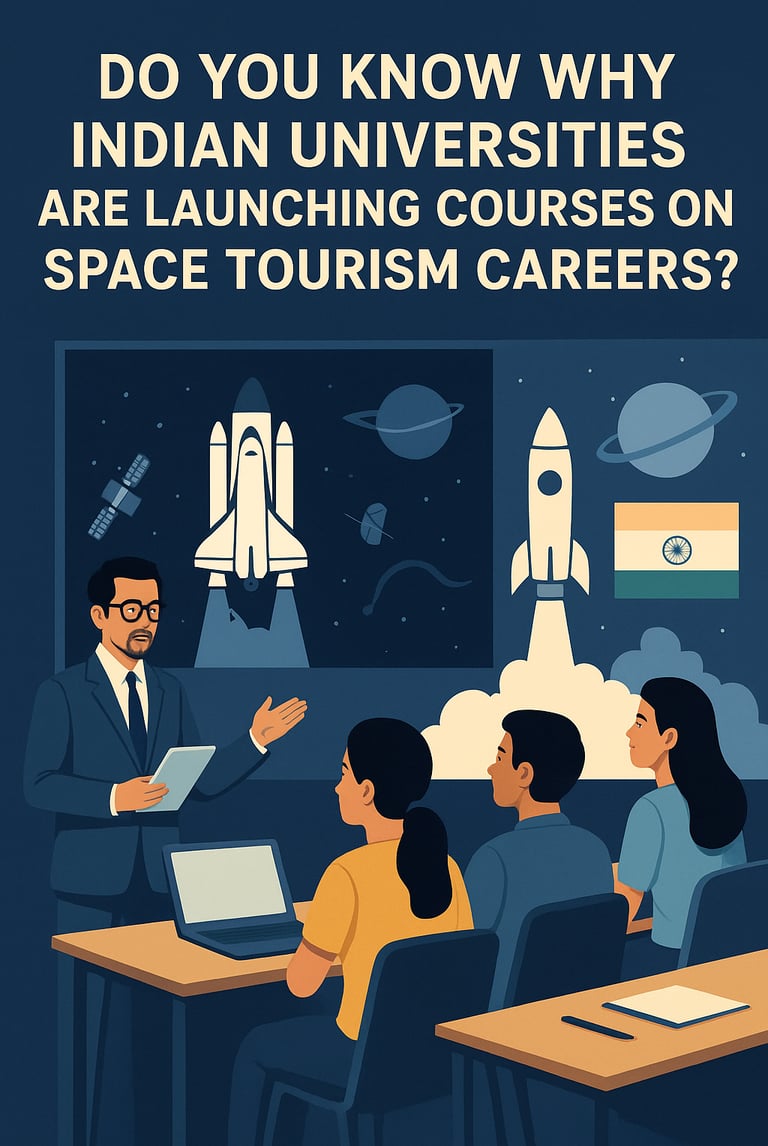Do You Know Why Indian Universities Are Training Students for Space Tourism Careers
Indian universities are stepping into the future by launching specialized courses on space tourism careers. With global players like SpaceX, Blue Origin, and Virgin Galactic creating opportunities, India is preparing talent for this trillion-dollar industry. Here’s why academia is joining the space race.
TECH & SCIENCEKNOWLEDGE & EDUCATION
Do You Know Team
8/31/20253 min read


The concept of space tourism—once limited to science fiction—is now an emerging global industry. In the past decade, billionaires like Elon Musk (SpaceX), Jeff Bezos (Blue Origin), and Richard Branson (Virgin Galactic) have turned dreams into reality by offering commercial space flights. India, with its low-cost space program led by ISRO, is rapidly catching up. Recognizing the need for specialized talent, several Indian universities are launching courses on space tourism careers, covering aerospace engineering, space hospitality, astro-medicine, and even orbital law.
This shift not only positions India in the global space race but also offers students a chance to become pioneers in the world’s most futuristic industry.
1. The Rise of Space Tourism: From Fiction to Reality
Space tourism has moved from imagination to execution. In 2021, Virgin Galactic’s successful commercial test flight with Richard Branson proved that civilian space travel is possible. By 2025, over 1,000 people globally have booked suborbital space tickets, with demand outpacing supply. In India, universities see this as a career goldmine for their students. According to Morgan Stanley, the global space economy is expected to reach $1 trillion by 2040, and space tourism will be a key driver.
2. Why Indian Universities Are Entering the Race
Indian academia has a history of aligning with emerging industries. From IT courses in the 1990s to AI and Data Science in the 2010s, universities adapted to meet job market demands.
Now, space tourism is the next frontier. Some key reasons:
ISRO’s cost-efficient missions like Chandrayaan-3 and Aditya-L1 boosted global trust in India.
Private players like Skyroot Aerospace, Agnikul Cosmos, and Bellatrix are building rockets and satellites.
The growing demand for global space workforce—pilots, space engineers, medical specialists, and legal experts.
Government’s New Space Policy 2023, which encourages private participation.
3. Types of Courses Launched in India
Indian universities are designing multi-disciplinary programs for the space tourism era:
Aerospace & Astronautics Engineering – Training students to design rockets, sub-orbital vehicles, and space stations.
Space Hospitality & Tourism Management – Preparing professionals for comfort, food systems, and safety in microgravity.
Astro-Medicine – Doctors learning to treat space-related health challenges like bone density loss and radiation exposure.
Space Law & Ethics – Courses on ownership of celestial resources, liability in accidents, and international treaties.
Robotics & AI for Space Tourism – Training in automation for cabin assistance and space station maintenance.
4. Live Examples from Indian Universities
Indian Institute of Space Science and Technology (IIST), Kerala – Offering advanced aerospace engineering modules tailored to future commercial missions.
Amity University, Noida – Announced short-term certificate courses on space management and law.
BITS Pilani – Partnered with startups in aerospace to design research projects on human space travel.
Private EdTech Platforms – Byjus and UpGrad are developing online "SpaceTech Careers" courses with global experts.
5. Global Inspiration for India
Embry-Riddle Aeronautical University (USA) already offers spaceflight operations programs.
International Space University (France) has launched degrees in space entrepreneurship.
India’s entry ensures that its youth are not left behind in a trillion-dollar race.
6. Skills Future Space Tourists & Workers Will Need
Universities are equipping students with:
Spacecraft Operations Knowledge
Astronaut-Level Physical & Mental Training
Radiation Protection & Safety Engineering
Zero-Gravity Hospitality Management
Cross-Disciplinary Communication Skills (engineering + law + business)
7. Career Opportunities for Indian Students
Graduates can explore jobs such as:
Space Tourism Pilots (with companies like Blue Origin)
Orbital Tour Guides
Space Hospitality Officers for suborbital hotels
Legal Consultants for interplanetary property rights
Medical Specialists for Space Health
According to PwC, by 2035, over 50,000 space tourism jobs will open globally, and India is preparing to claim its share.
8. Live Indian Startup Examples
Skyroot Aerospace (Hyderabad) – Conducted India’s first private rocket launch in 2022.
Agnikul Cosmos (Chennai) – Developing customizable 3D-printed rockets.
Bellatrix Aerospace (Bangalore) – Specializing in space propulsion systems.
These startups will directly hire graduates trained in space tourism fields.
9. Challenges Ahead
Despite progress, there are hurdles:
High Training Costs – Astronaut-style training is expensive.
Limited Infrastructure – India needs more private spaceports.
International Competition – US, Europe, and UAE are ahead.
Regulations – Space law is still evolving in India.
FAQs
Q1. Which Indian universities are offering courses on space tourism careers?
IIST, Amity University, and BITS Pilani are early movers, with more universities expected to join.
Q2. What kind of jobs will be available in space tourism?
Pilots, hospitality managers, lawyers, doctors, and engineers will all find roles.
Q3. Will ISRO also hire space tourism graduates?
Yes, especially as ISRO partners with private companies for future space projects.
Q4. Is space tourism affordable for Indians?
Initially, no. But costs are expected to fall significantly by 2035 as private companies expand.
Conclusion
The launch of space tourism courses in Indian universities shows how seriously the nation is preparing for the next trillion-dollar industry. By merging education, innovation, and entrepreneurship, India aims to create a generation of professionals ready to make space travel safe, affordable, and exciting. The students enrolling today could become the pilots, engineers, or lawyers of tomorrow’s interplanetary economy.
#DoYouKnow #SpaceTourism #IndianUniversities #ISRO #SpaceCareers #FutureOfEducation #SpaceEconomy #AI #Innovation
Knowledge
Empowering minds with reliable educational content daily.
Newsletter Signup
© 2025 DoYouKnow. All rights reserved.
Stay Ahead of the Trends – Join Our Newsletter
